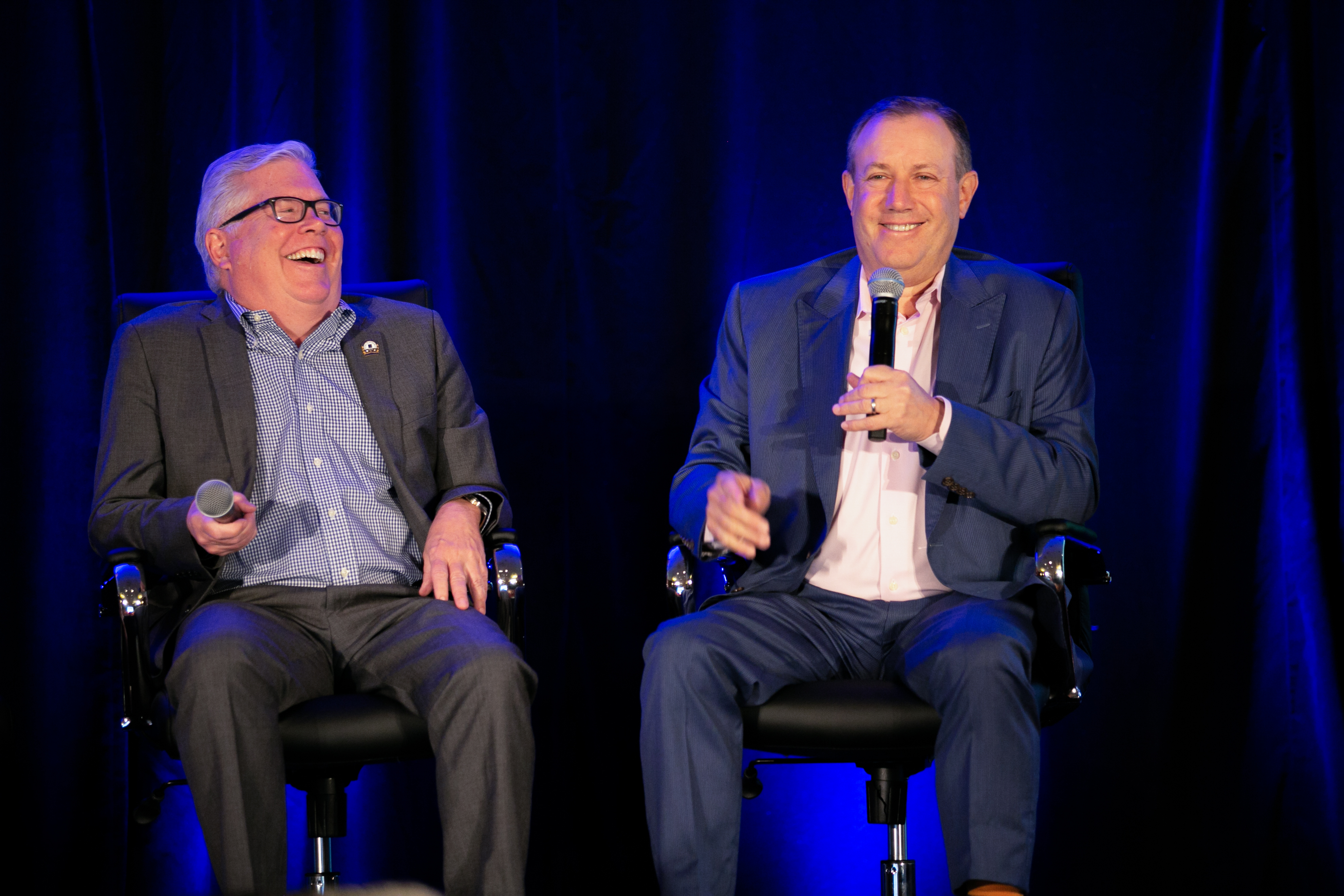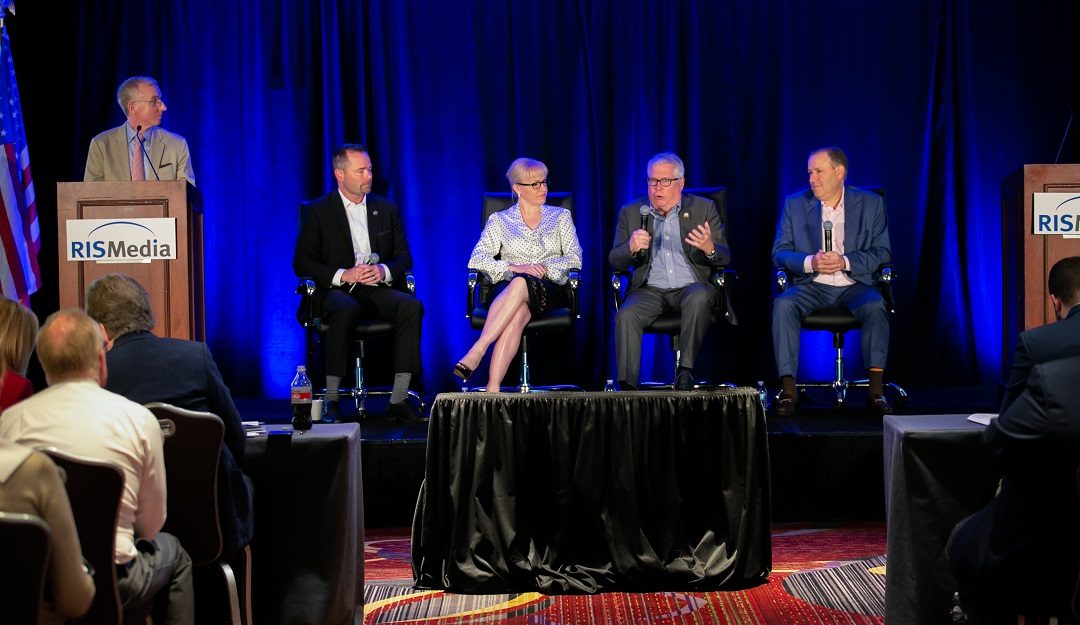(Above, L to R) Marc Gould, National Association of REALTORS®; Sam DeBord, Real Estate Standards Organization (RESO); Rebecca Jensen, Midwest Real Estate Data (MRED); Richard Haggerty, Hudson Gateway Association of REALTORS® (HGAR); and Ken Baris, Jordan Baris Inc. REALTORS® Real Living, discuss “The State of Real Estate Data: Have We Moved the Ball Forward?” at RISMedia’s 2019 Real Estate CEO Exchange. (Credit: Korin Krossber of PlanOmatic)
How far has the industry come in the effort to standardize, control and streamline real estate data? Experts recently tackled that question and more during a panel session at RISMedia’s 2019 Real Estate CEO Exchange, held in New York City September 18-19.
Marc Gould, senior vice president of Member Development at the National Association of REALTORS®, moderated the session, “The State of Real Estate Data: Have We Moved the Ball Forward?” Gould started off by asking Sam DeBord to explain why he made a “big leap” earlier this year from successful broker to CEO of the Real Estate Standards Organization (RESO).
DeBord said it’s a “critical time for the brokerage industry and organized real estate, in general.” That’s due in no small part to technological changes and an “increase in consumer demands on the transaction process.” Today, people have grown to expect speed, simplicity and interoperability from technology.
“While most of the world is serving consumers with that kind of technology, in real estate, in a lot of ways, we’re not,” said DeBord. “We’re still giving a Palm Pilot experience to consumers who want a smartphone experience.”
According to DeBord, it’s incumbent on the industry to follow the lead of other sectors and collaborate on data standards for the betterment of everyone.
“The biggest technology companies in the world have adopted open standards to raise their foundation,” he noted. “Amazon, Google, Netflix—you name any of these companies, and they work together to build complicated standards so that the World Wide Web works well and their tools integrate to provide that consumer experience everybody expects. Then they compete, then they go after each other, building their businesses on top of this higher foundation.”
RESO works to spur similar cooperation and innovation among real estate stakeholders. Previously part of NAR, RESO was incorporated as an independent trade group in 2011 to develop, adopt and implement open data standards and processes for the industry.
“I think RESO adoption is absolutely critical, not just through brokerages, but through MLSs,” said Rebecca Jensen, president and CEO of Midwest Real Estate Data (MRED).
She said industry interest in standard adoption is rising, noting that RESO conferences have grown significantly from “just a gathering of a few engineers working inside an office at NAR” to large events with sold-out hotels.
Gould asked DeBord how brokers can get involved in RESO and why it’s important.
“For the brokers in the room, you know that some of your tools and software companies are fantastic, but they don’t all talk to each other,” DeBord said. “They don’t transfer data between the MLS and the broker back-office tools and any of the tools you use with your agents. Ask those companies if they’re engaging in the process with RESO to adopt data standards.”
He added, “It’s not just an MLS’ job to adopt standards; it’s about brokerage technology and your vendors’ technology and being able to get all those organizations to say that not only are they members, but they’re actively working to implement those standards across tools.”
Gould said, “I think one of the biggest hooks here is that if there aren’t common standards and if we don’t have this basic platform that everyone can work off of, the brokers could find their differentiating technology, but if it can’t grab the information that’s already out there, it just falls flat.”
“At the end of the day, it’s about making business easier,” said DeBord. “Maybe your agents and some brokers don’t necessarily get data standards down to the core, but they care about results. They care about efficiency.”
On the MLS front, Jensen said, “All of this disorder and fragmentation really inhibits the adoption of technology in our industry. The easier we make it to work with MLS data, the more innovation and competition will be brought to bear.”
Jensen is a true believer in collaboration, as proven by MRED’s partnership with several other MLSs across the U.S. to create the MLS Grid, which offers a consolidated data platform based on RESO standards and standard license agreements designed to improve MLS services and benefit thousands of users.

Richard Haggerty, Hudson Gateway Association of REALTORS® (HGAR), and Ken Baris, Jordan Baris Inc. REALTORS® Real Living, at the CEO Exchange (Credit: Korin Krossber of PlanOmatic)
“We decided there’s definitely a need to have a friendly platform that is operated by MLSs and that can do exactly what we’ve been talking about,” said Jensen. “Consolidation is a great thing, but that’s not the only solution out there. MLSs can actually work together and collaborate to make the marketplace better.”
Richard Haggerty, CEO of the Hudson Gateway Association of REALTORS®, is in the midst of launching a regional MLS in the New York metropolitan area.
“The journey started at an industry conference, where they were talking about consolidation,” he recounted. “A lot of the time, that’s all we hear about—consolidation—but this particular map had New York City with big circles. It really struck me that we had to do a better job of leveraging the real estate data in what I consider the greatest geography in the world to the benefit of our members, as opposed to letting outside entities do that.”
After that conference, Haggerty talked to an executive from the Multiple Listing Service of Long Island Inc., a subsidiary of the Long Island Board of REALTORS®, and the groups eventually decided to partner on creating a regional MLS.
“There is no MLS in Manhattan,” said Haggerty. “We are going to change that. Especially in the city, they suffer from data disorder.”
So far, Haggerty said, he’s received mixed reactions ranging from “Yes, we need that” to “Good luck with that.”
“Some people are very entrenched in doing business the way they’ve been doing it for a long time, but from my perspective, the status quo is not acceptable,” he said. “If we cannot drive change to the benefit of our members, then we need to get into another business. I do think there are a lot of visionaries in Manhattan that realize this is the future.”
Ken Baris, president of Jordan Baris Inc. REALTORS® Real Living, gave a broker’s perspective and discussed the importance of data science.
“Data is not just charts and graphs that you sort of glaze over. It’s not just a list of agents by sales volume and market area,” said Baris. “For us, data science is how we take the information available to us and structure it in a way that we get actual insights from it for driving our business forward. The problem is the data we have needs to be structured properly.”
He noted that brokers can use data to help with establishing pricing strategies, recruiting, determining who needs coaching and figuring out the best time and areas to do mailings, among other benefits.
Gould said acknowledging the difference between information and insight is “a really interesting differentiator.”
“Information doesn’t tell you what to do. It just gives you a little barometer,” explained Baris. “Insights tell you how to act on the information.”
He said data science “isn’t cheap,” but it’s worth it. Baris also suggested it’s best to outsource data science. “At the end of the day, we’re brokerages. I don’t want to be a data scientist.”
He joked, “The one thing I can do is calculate commissions very quickly, but other than that, math? Who needs it?”
Gould then asked what it takes to help ensure brokers and agents understand and use the technology and data available to them.
“You have to make it very easy,” said Baris. “No matter how complicated it is under the hood, what they see on their screen has to be simple, fast and something they can relate to.”
He added that training is important, and conducting case studies can determine what’s working and what isn’t.
“Communication needs to be constant,” added Haggerty. “You can’t just roll out a shiny new toy, say it’s great and expect everyone to adopt it.”
Notably, Baris said, “We find the associates that are using our data tools are far excelling compared to the associates that aren’t.”
There’s an awful lot of data and technology out there for real estate professionals to take advantage of. Sorting through it all may be difficult, but by embracing standards, collaboration, innovation and education, the industry can harness the power of data to create a better experience for brokers, agents and, most importantly, homebuyers and sellers.
For CEO Exchange continuing coverage, visit RISMedia.com.
Joe Bebon is RISMedia’s associate editor. Email him your real estate news ideas at jbebon@rismedia.com.





I agree the MLS format is a detraction. It also provides access to non-broker transactions like FSBO’s.
I truly believe real estate requires the knowledge of a professional in order for the consumer to be treated fairly and to be properly informed.
Nevertheless when we can coordinate MLS data across the board, we will have better communication among brokerages across the U.S. Many buyers and sellers are moving from one state to another as employment opportunities arise. A change in the MLS is long past due.